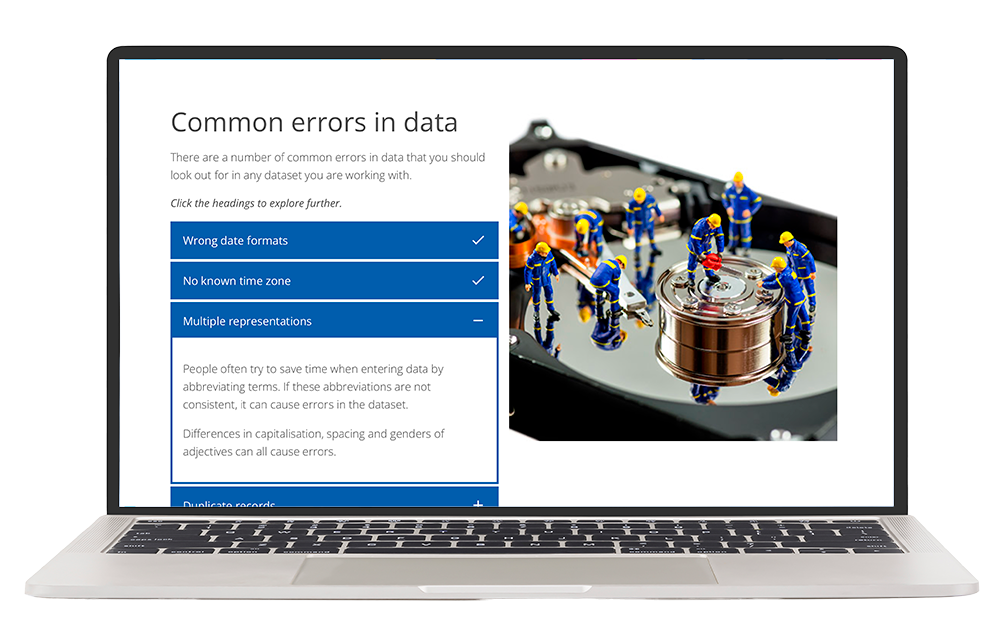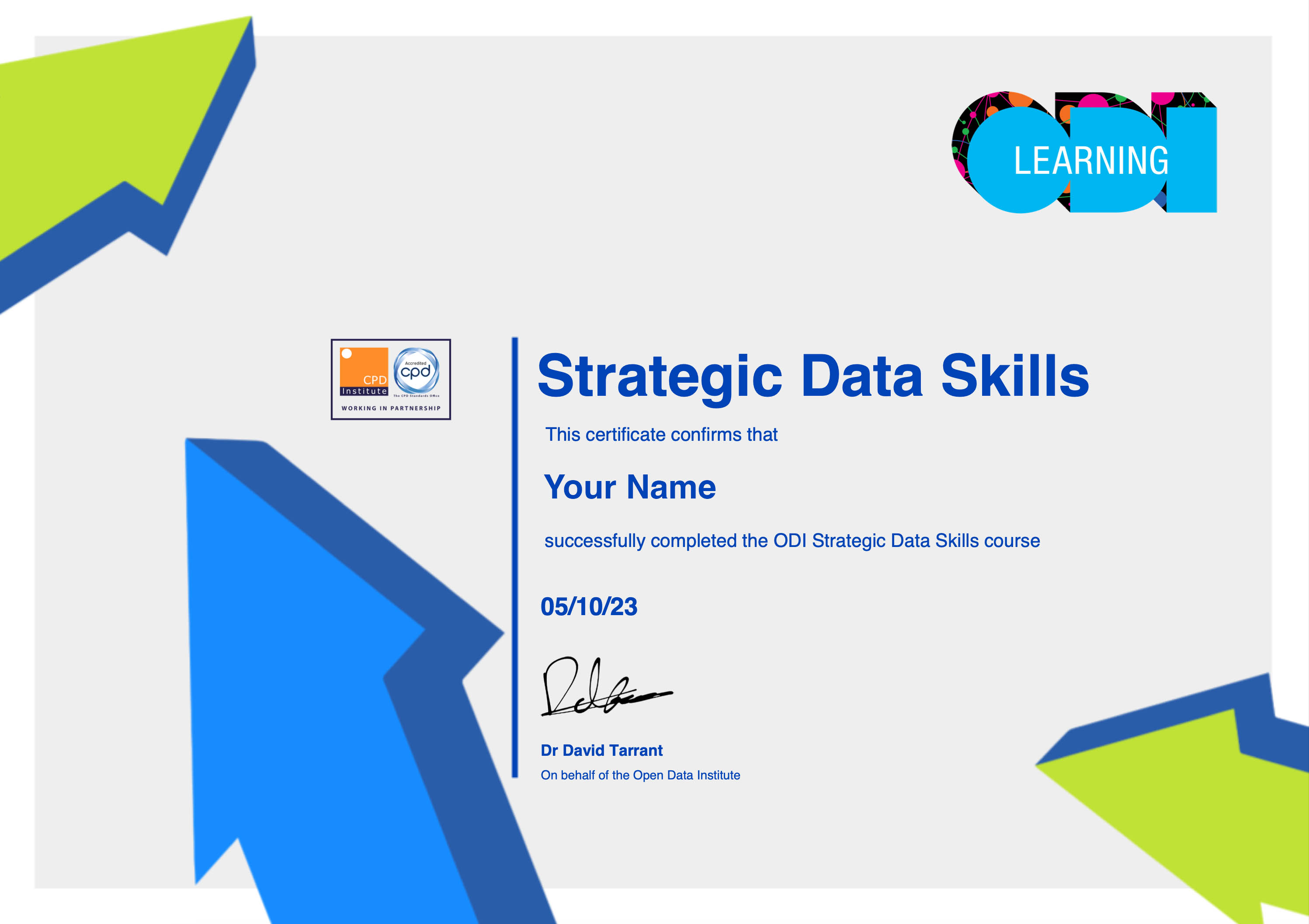Strategic Data Skills
Build data skills and practical expertise at a pace that’s right for you. This course is for leaders and specialists who want to develop the knowledge, practical skills and technical know-how to make better decisions using data, without complex programming techniques. Join the course to benefit from an AI tutoring assistant, interactive content, and a hands-on assignment. Then showcase your data literacy to your peers with a certificate of completion from the ODI.
Build the strategic skills you and your business need
This course is for people who want to work strategically with data - using it in their role to inform decisions from strategic objectives to the day to day operations of an organisation.
Over the course of five interactive, online modules you will learn how to:- Identify how open and shared data infrastructures can improve decision making.
- Apply strategic thinking to new data projects.
- Open and shared approaches that make it easier to create and build impactful products and services.
- Make better decisions with data.



Expert led or Self-Paced
You choose how you would like to enhance your strategic data skills. A self paced option is available on-demand and offers 6-months of access to course materials. However, if you want an expert to help guide your journey, provide insight into latest trends and also provide bespoke feedback on assignments in the course then we also offer an expert-led version of the course.
Self-Paced
Expert Led
ODI Members
Start now
6 months access
£510 + VAT
General Admission
(Non ODI Members)
Start now
6 months access
£600 + VAT
T o ensure inclusivity, we offer discounted pricing for customers from lower or middle-income countries.
o ensure inclusivity, we offer discounted pricing for customers from lower or middle-income countries.
Please contact us for further information.
If you represent a business interested in purchasing four or more course spaces, please reach out to us for personalised discounted rates.
Inspired by data pioneers, built for you
At a time when businesses are trying to get value from AI and data it’s more important than ever to understand the landscape, filter out the noise and set a clear direction.
The Open Data Institute is a world-leading research and training institution founded by the creator of the web, Sir Tim Berners-Lee, and AI pioneer Professor Sir Nigel Shadbolt. Our research, training and practical work helps people, companies and governments build data infrastructure that benefits all.
More than 52,000 people worldwide have developed their data literacy using the ODI’s self-guided training.
Created by a team of data specialists and learning designers, the Strategic Data Skills course will guide you as you turn theory into practice, and as you step-up to play a strategic role in helping your organisation get value from data.


How Strategic Data Skills works
Our courses are not simply read. They are designed for active learning helping you prioritise the application of learning through authentic action.
The Strategic Data Skills curriculum is based on a decade of research and practical experience working with, training and advising data-intensive organisations such as Google, Roche and the Singapore Government.
Your strategic data skills learning experience includes:
- Interactive, mobile friendly learning
- Accessible content that uses simple, non-technical language
- An AI tutoring assistant
- Support from the ODI team
- Knowledge checks
- 6-months access to the content and our learning platform
- A certificate of completion from the Open Data Institute
Who the course is for
This course is for non-technical people who want to create an effective data ecosystem in their organisation and sector without learning complex programming.
Previous attendees include Founders, CEOs, Marketing VPs, Product Managers and Analysts.
Attendees come from start-ups, multinational companies, local and central government, NGOs and charities.
"A really great course for people that need to work with data without being a fully fledged analyst."
Strategic Data Skills, 2023
Natalie Gudgeon, Data Strategy Lead, Valuation Office Agency
Introducing Strategic Data Skills: Watch the video for a brief overview from one of our expert tutors
Value for you - value for your business
Successfully complete Strategic Data Skills to demonstrate your ability to help any organisation generate actionable, strategic insights from data.
- Boost your career – demonstrate to potential employers your ability to work with data, showcase your new skills to peers and managers, the course certificate from the ODI provides evidence of your skills.
- Data to inform your work – the course shows you how to make better decisions with data.
- Avoid harmful impacts – discover how to balance the need to create an impact, with the need for an ethical approach whilst working with data.
- Embrace open innovation – get hands-on experience of how you can use open and shared approaches to working with data to create exciting new products and services.
How this course will benefit your company
After attending Strategic Data Skills participants have the ability to help any organisation:
- Make better decisions with data.
- Demonstrate to clients and stakeholders their ability to work effectively with data.
- Identify how open and shared data infrastructures can improve decision making.
- Apply strategic thinking to new data projects.
- Adopt open and shared approaches that make it easier to create and build impactful products and services.
- Avoid reputational risks by considering data ethics as part of a project.
Please contact us you would like further information on our Strategic Data Skills self-paced course
"This course has given me the confidence to talk about data analysis and visualisation and understand how the data we use and how we share it is changing and what that means for data providers and everyone who uses data"
Strategic Data Skills, 2022
Philippa Vigano, Innovative Technologies Programme Manager, NatureScot
Learning Pathway: Data Skills without Programming
Strategic Data Skills
Choose between tutored or self-paced learning formats. A comprehensive course designed for individuals seeking to work strategically with data without delving into complex programming concepts.
After completing Strategic Data Skills, consider advancing to:
Introduction to Data Ethics and Data Ethics Canvas or Understanding Data Ethics and AI. These learning opportunities will provide a well-rounded understanding of data ethics, complementing your strategic data skills.
Best Practices for Data on the Web course (coming soon).
You may also be interested in
 Tutor-led
Tutor-led
Strategic Data Skills (tutor-led)
A comprehensive course designed for individuals seeking to work strategically with data without delving into complex programming concepts.
- September 2023
- 48 h
Understanding Data Ethics & AI
Knowledge and tools to understand the realm of data ethics and apply them effectively in professional settings. Examine data ethics within your own professional practice.
- Coming soon
- 8 - 10h
Introduction to Data Governance
For strategic or leadership roles responsible for directing data management. Gain the knowledge and decision-making capabilities to guide data-related processes effectively.
- Coming soon
- 8 h
.png?width=121&height=56&name=learning-150-Blue-L%20(1).png)